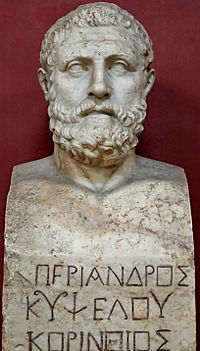Periander facts for kids
Quick facts for kids Periander |
|
|---|---|
| Tyrant of Corinth | |

Periander, Roman copy after a Greek original of the 4th century BC, Vatican Museums.
|
|
| Reign | 627–585 BC |
| Predecessor | Cypselus |
| Successor | Psammetichus |
| Born | prior to 635 BC Corinth |
| Died | 585 BC Corinth |
| Consort | Lyside |
| Issue |
|
| Greek | Περίανδρος |
| House | Cypselid |
| Father | Cypselus |
| Mother | Cratea |
| Religion | Greek polytheism |
Periander (died around 585 BC) was an important ruler of ancient Corinth, a powerful city in Greece. He was the second leader of the Cypselid family. During his time, Corinth became one of the richest and most successful city-states in Greece.
Some stories say Periander was a tough and strict ruler. However, other accounts describe him as a fair leader who tried to make sure wealth was shared among the people of Corinth. He is often seen as one of the Seven Sages of Greece. These were wise men from the 6th century BC, famous for their knowledge. Other Sages included Thales, Solon, Cleobulus, Chilon, Bias, and Pittacus.
Contents
Periander's Life and Family
Family Background
Periander was the second ruler of Corinth. His father was Cypselus, who started the Cypselid family's rule. Periander's mother was named Cratea.
Periander married a woman named Lyside, also known as Melissa. She was the daughter of Procles and Eristenea from Epidaurus. They had two sons. One was Cypselus, who was said to be not very bright. The other was Lycophron, who was known for his intelligence.
Family Troubles
Sadly, Periander accidentally caused his wife's death during an argument. This made his son Lycophron very angry and sad. Lycophron decided to leave Corinth and went to live in Corcyra.
When Periander grew old, he wanted Lycophron to return and become the next ruler. He sent for his son, but the people of Corcyra did not want Lycophron to leave. They killed him to prevent him from going back to Corinth. The death of his son deeply saddened Periander, and he passed away soon after.
Periander's nephew, Psammetichus, became the next ruler. However, Psammetichus ruled for only three years. He was the last ruler from the Cypselid family.
Periander's Rule and Achievements
Building Corinth's Power
Periander helped make Corinth a major trading hub in Ancient Greece. He set up new settlements, called colonies, in places like Potidaea and Apollonia. He also took control of Epidaurus and built good relationships with other important cities like Miletus and Lydia. He even added Corcyra, where his son lived, to Corinth's control.
Periander is also famous for creating the Diolkos. This was a special transport system that allowed ships to be moved across the narrow strip of land called the Isthmus of Corinth. This saved ships from having to sail all the way around the Peloponnese.
Public Works and Arts
Money from tolls paid by ships entering Corinth's port was a huge source of income for the government. Periander used this money to build many important public projects. He built temples and other structures that improved the city.
He also supported arts and culture. He invited the famous poet Arion from Lesbos to Corinth for an arts festival. Many festivals were held, and buildings were constructed in the Doric style. A unique Corinthian style of pottery also became popular during his time.
Leadership Style
Periander's way of leading was called a 'tyranny'. In ancient Greece, a tyrant was a ruler who came to power without being chosen by the people. They often favored the poor over the rich. Sometimes, they would take land from wealthy owners or create laws that limited their special rights. Tyrants also started building projects like temples, ports, and city defenses. They improved city drainage and water supplies. Periander's actions greatly helped trade and business in Corinth.
Writing and Philosophy
Periander was known for supporting literature and early philosophy. Some say he even wrote a long poem himself. In an ancient book called Lives and Opinions of Eminent Philosophers, the writer Diogenes Laërtius mentions that different authors disagreed about who should be on the list of the Seven Sages.
Even though Periander is often on this list, some thought his strong actions made him seem more like a famous ruler than a wise philosopher. However, he did try to bring more order to Corinth.
See also
 In Spanish: Periandro para niños
In Spanish: Periandro para niños
 | Aaron Henry |
 | T. R. M. Howard |
 | Jesse Jackson |

